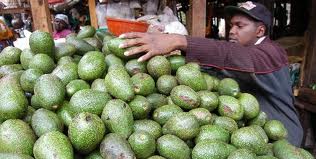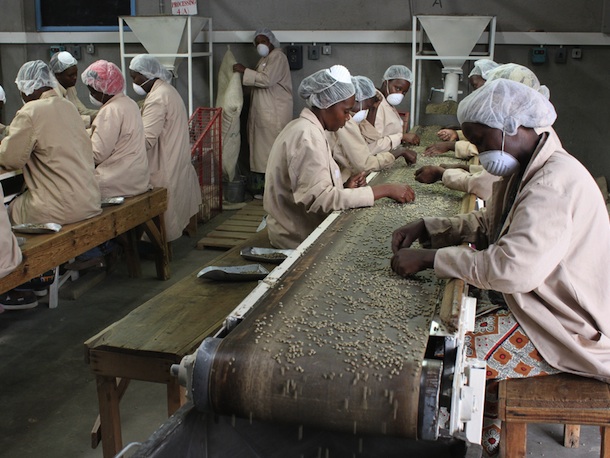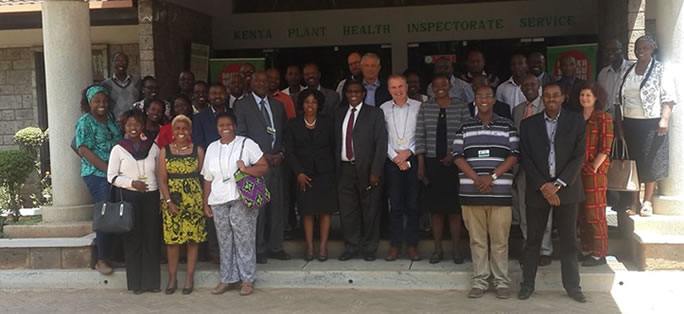
Trader displaying avocadoes in market. Ban on export of Hass and Fuerte avocado varieties is temporarily lifted. Kenya produces an estimated 200,000 metric tonnes of avocado annually but only 16,000 is exported.
Small scale farmers in Kenya are breathing a sigh of relief thanks to the government last week temporarily lifting the ban on exports of avocadoes.
Fuerte and Hass avocado varieties export was banned in December last year due to a shortage in the market as they were off-season; this influenced the sale of the fruits in the market while still immature. Fuerte which is now on-season is at the moment allowed for export while Hass exportation will begin exportation next month when it will be on-season.
RELATED ARTICLE: Government bans avocado exports on shortages
The Kenya Plant Inspectorate Service (KEPHIS), the parastatal responsible for ensuring the quality of agricultural inputs and produce, has now set new guidelines to monitor the harvesting process to prevent immature fruits from reaching the market.
“Traders can now export the Fuerte avocadoes, however, they will need a clearance certificate from KEPHIS”, said Alfred Busolo, Agriculture and Food Authority's (AFA) director general.
Over 75 per cent of small-scale farmers in Kenya were affected by the ban. So bad was it for them that avocado farmers from Murang’a County filed a case against the government at the High Court last month arguing that they will suffer huge losses because some of them had already harvested their fruits.
RELATED ARTICLE:More farmers certified to sell avocado in EU
Smallholder avocado farmers in the country produce about 81,000 metric tonnes annually of the fruit, of these, 30,000 to 40,000 tonnes goes to waste due to a lack of ready market. Additionally, Kenya produces an estimated 200,000 metric tonnes of avocado annually but only 16,000 is exported, with the figure expected to reduce due to the ban.
Fresh produce exporter companies such as Selina Wamucii (Kenya) Ltd have thus welcomed the move by the government to lift the ban temporarily terming it as a sigh of relief to the sector and the farmers.
"It's definitely very good news for the small family growers who produce over 70 per cent of avocado that is exported in Kenya,” said Selina Wamucii CEO, John Oroko.
“The ban was a wake-up call for exporters as was imposed to stop exporters from shipping out immature crop because of high demand in the world market. We are now getting into the main avocado season and hope that all industry players comply with the export requirements. The responsibility is now on the exporters to follow the protocols to avoid any future suspensions.”
RELATED ARTICLE:Avocado farmers to earn more from EU in April
Agriculture and Food Authority, the parastatal in charge of promoting best practices in, and regulating, the production, processing, marketing, grading, storage, collection, transportation and warehousing of agricultural and aquatic products among other objectives, rates Kenya as the second largest avocado growing and exporting country in Africa after South Africa.
Last year for example, 461.1 tonnes worth Sh7.1bn was produced as compared to 387.2 tonnes worth Sh5.4bn in 2016.These fruits contribute about seven per cent of the total fruit export to the global market in Kenya, according to AFA data.
Some of the countries which have shown interest in Kenyan avocadoes include Russia, Hong Kong, Singapore, Belgium, Germany, Netherlands, France, Spain, Iran, Libya, and Egypt among others.
RELATED ARTICLE: Global avocado demand doubles prices
Write comment (0 Comments)

















